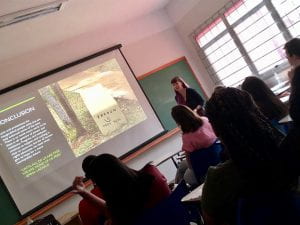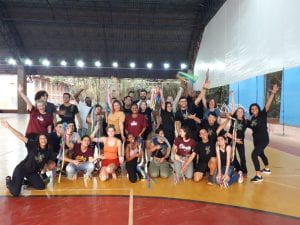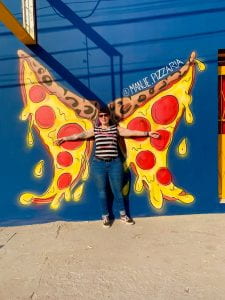
So, my second week in Brazil was quite different than the first, with much of our time spent on campus at UFMS (Universidade Federal de Mato Grosso do Sul), listening to lectures about various issues that affect Brazilian citizens, such as women’s rights, the quota system and refugee policies. I also spent much of the week working on a final research project that I and my classmates presented the day before we departed. We each chose a topic that was of interest to us, and I chose to write about how neo-colonial power structures oppress different intersectional marginalized groups (a mouthful, I know!), and how these groups resist via social movements or with other approaches. I realized after it was too late that maybe my project was a little over the top, but I was glad I took it on. I have been accepted for a Bamford Fellowship, and so this research directly ties into that work. What that means is, the more work I do there, the smoother things go as the research continues.

One of the things that was super interesting to me was learning about the different ways that places are colonized. I now have a strong understanding of three different lo cations; the U.S., Hawai’i, and Brazil. Each colonization story has its similarities and its differences, and each was brutal in its own special way. I won’t delve too deeply into this right now, but I do think it is important to remember these histories when trying to understand the present- where have we come from, where we are at, and when considering the future, how can we do better? Can we be better people, as nations, communities and for the planet? What would it take, and what could it look like?
On the 10 hour flight from South America to North America, I had the serendipitous experience of being seated next to a Brazilian businessman in the tech industry, who was traveling to Kentucky to pitch a business deal. He was young, and he was talking about the difference between the ways the older generation- including his managers- did things, versus the way he preferred to manage projects. What I came to understand from this exchange was that his managers had the mindset that money is what it is all about. For him though, it was more about sustaining good relationships. Money is great and all, but what he was reflecting on (and I think many of us do) is that money isn’t the way to keep people happy and satisfied in their jobs. There has to be more than that, good work-life balance, working from home or just being considerate of the needs of your coworkers.

Then, oddly, on my next flight, I was seated next to a man who travels the country training managers in this exact management style. He told me, “It’s the people that make or break your business, and you have to respect them, or you lose your most valuable resource.” Though I am not a business major, I feel that this in a way reflects a humanitarian sentiment. I hope more businesses catch on to this, and even beyond the employees, the people that are affected due to the business practices in various ways. This man I was traveling alongside also shared that he felt very strongly that everyone should have the opportunity to travel. It changes your perspectives and understanding of the world and the people that live in it. All of a sudden, the fires in the Amazon, thousands of miles away matter just as much as if they were burning right outside your front door.
I believe in the potential for people to do amazing things, to change the way the world works, to fix broken systems and replace them with ones that work for everyone, not just a few at the top. Sometimes, when I look around and take stock of current events, it is hard to keep believing this. Sometimes, I wonder how bad things will have to get for people to wake up and push back against terrible policies that tear families apart, block support for those who most desperately need it, ignore climate change, and on and on…. But then again, I have met people in Brazil who are just as passionate about creating this better world I dream of, and that fills me with hope. Of all the gifts I received from my journey to Brazil, the friendships I made are by far the most precious. The conversations we shared, the excitement, joy and laughter, and most of all, the lifelong connection we now have are things I never could have imagined I would experience. And now, I am a better, more educated and thoughtful person because of this once in a lifetime journey I had in Brazil.
Obregato, Brazil!
